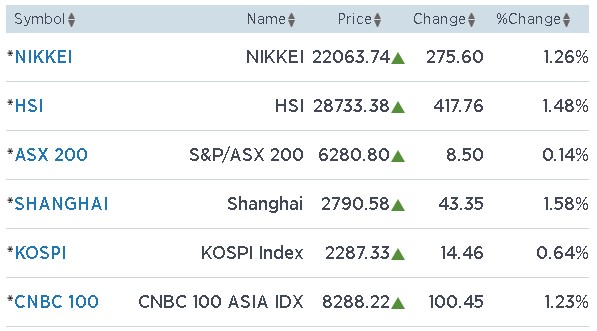
Asian shares rose on Monday, taking cues from Wall Street’s advance following the release of strong employment data for the month of June. Meanwhile, investors continued to keep an eye on trade after the U.S. and China exchanged tariffs last week.
Japan’s Nikkei 225 rose 1.27 percent, buoyed by the move higher in the electric appliances, construction and mining sectors, while the pharmaceuticals led gains. The broader Topix advanced 0.99 percent.
Elsewhere, the Kospi saw slimmer gains in South Korea, rising by 0.58 percent in the morning as tech stocks climbed while manufacturers declined. Index heavyweight Samsung Electronics rose 1.45 percent while Posco dropped 3.2 percent.
In Australia, the S&P/ASX 200 added 0.24 percent amid gains in banks and resources plays. Mining major BHP was up 1.87 percent, with banks also trading higher in the morning.
Greater China markets got a boost in morning trade. Hong Kong’s Hang Seng Index advanced 1.74 percent, with similar gains seen on the mainland. The Shanghai composite rose 1.66 percent and the smaller Shenzhen composite surged 1.57 percent.
MSCI’s broad index of shares in Asia Pacific outside of Japan rose 1.1 percent in Asia morning trade as nervousness seen in the markets recently appeared to somewhat subside.
Trade takes a backseat, for now
The improvement in sentiment in the session came after Friday’s developments on the trade front when U.S. tariffs on $34 billion in Chinese goods took effect, ramping up the country’s ongoing trade spat with China.
China followed up by promptly imposing duties of its own on the same value of U.S. products. China’s Ministry of Commerce said it had no choice but to respond to the U.S. after the latter “launched the largest trade war in economic history.”
U.S. President Donald Trump said on Friday that an additional $16 billion of Chinese goods would be subject to tariffs in two weeks, and that he was considering further slapping duties on an additional $500 billion in Chinese products.
“Trade talk, which is now becoming trade action, is creating uncertainty and starting to hurt business,” David Lafferty, chief market strategist at Natixis Investment Managers, said in a recent note. “Inflation and higher prices are the least of my worries … Disrupting global supply chains is a bigger risk than the dollar value of the tariffs themselves,” he added.
Markets in Asia had taken a hit last week in the lead-up to U.S. and China tariffs kicking in on Friday, with investors jittery over the prospects of further escalation in tensions between the world’s two largest economies having an impact on economic growth.
Monday’s gains also came on the back of an advance in U.S. stocks on Friday as better-than-expected jobs data stateside overshadowed tariffs kicking in. The Dow Jones Industrial Average rose 0.41 percent, or 99.74 points, to close at 24,456.48, the S&P 500 gained 0.85 percent to end at 2,759.82 and the Nasdaq composite surged 1.34 percent to finish at 7,688.39.
The U.S. economy added 213,000 jobs in June, topping the 195,000 forecast in a Reuters poll. Wage growth, however, slightly missed expectations.
“Overall, it was a solid report and there is no evidence of any let-up in labor market strength … The momentum in the jobs data is still consistent with the Fed hiking in September,” ANZ analysts said in a note.
In corporate news, smartphone maker Xiaomi debuted for trade in Hong Kong on Monday after the company priced its initial public offering at 17 Hong Kong dollars ($2.17) per share, the low end of an indicative range. Xiaomi said last month that it did not have a time frame for its share offering on the mainland.
Elsewhere, British Prime Minister Theresa May last week won agreement from her cabinet to remain in a free trade area for goods with the European Union, which analysts see as a “soft Brexit.” The pound last traded at $1.3294, giving up some of its earlier gains after the U.K.’s Brexit secretary resigned.
The dollar was broadly softer, with the dollar index at 93.892 at 10:06 a.m. HK/SIN, compared to levels above the 94 level last week. Against the yen, the dollar was mostly steady at 110.47.

